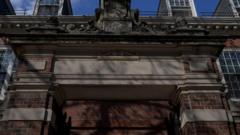A U.S. District Judge has issued a temporary restraining order against the Trump administration's recent plan to bar Harvard from enrolling international students, following a lawsuit by the prestigious university. Harvard contends that the order represents a serious infringement of the law and of academic freedom, arguing that the administration’s allegations about its failure to counter antisemitism are baseless and unfounded. The conflict stems from broader accusations directed at Harvard about its hiring and admission practices.
Judge Temporarily Halts Trump’s Bid to Ban International Students from Harvard

Judge Temporarily Halts Trump’s Bid to Ban International Students from Harvard
A federal judge has blocked the Trump administration’s attempt to revoke Harvard University’s ability to enroll foreign students amid ongoing tensions.
In her ruling, Judge Allison Burroughs paused the Department of Homeland Security’s action to strip the university of its access to the Student and Exchange Visitor Program (SEVP), crucial for managing foreign students. The next hearing is scheduled for May 29 in Boston. Harvard's President, Alan Garber, condemned the Department’s action, framing it as an attack on the university's autonomy and mission. Meanwhile, the White House criticized the ruling, with deputy press secretary Abigail Jackson claiming it demonstrated the judiciary's supposed liberal bias.
As graduation season begins, uncertainty looms over the future of many international students at Harvard, who represent more than a quarter of the student population. Some students share their concerns about job opportunities and visa regulations. With their academic futures hanging in the balance, students expressed mixed emotions—relief at the restraining order, yet anxiety about potential deportation.
International students at Harvard hail from various countries, with notable representation from China, Canada, India, South Korea, and the UK. The potential financial repercussions of sidelining foreign students are significant, as they often pay full tuition which supports financial aid for their American counterparts.
The administration's actions towards Harvard reflect a wider pattern of confrontation with elite institutions, which have been accused of not sufficiently addressing conservative viewpoints. President Trump suggested that more measures against universities could be forthcoming, following a recent freeze on $2.2 billion in federal funding to Harvard. Legal experts indicate that while federal courts may initially oppose the administration, the ultimate decision could vary at the Supreme Court level.
Students fear that political conflicts may affect their status, presenting a grim reality of potential transfers or returns home. The uncertainty remains widespread among the international student body as they navigate their academic and professional futures in a rapidly changing environment.
As graduation season begins, uncertainty looms over the future of many international students at Harvard, who represent more than a quarter of the student population. Some students share their concerns about job opportunities and visa regulations. With their academic futures hanging in the balance, students expressed mixed emotions—relief at the restraining order, yet anxiety about potential deportation.
International students at Harvard hail from various countries, with notable representation from China, Canada, India, South Korea, and the UK. The potential financial repercussions of sidelining foreign students are significant, as they often pay full tuition which supports financial aid for their American counterparts.
The administration's actions towards Harvard reflect a wider pattern of confrontation with elite institutions, which have been accused of not sufficiently addressing conservative viewpoints. President Trump suggested that more measures against universities could be forthcoming, following a recent freeze on $2.2 billion in federal funding to Harvard. Legal experts indicate that while federal courts may initially oppose the administration, the ultimate decision could vary at the Supreme Court level.
Students fear that political conflicts may affect their status, presenting a grim reality of potential transfers or returns home. The uncertainty remains widespread among the international student body as they navigate their academic and professional futures in a rapidly changing environment.






















